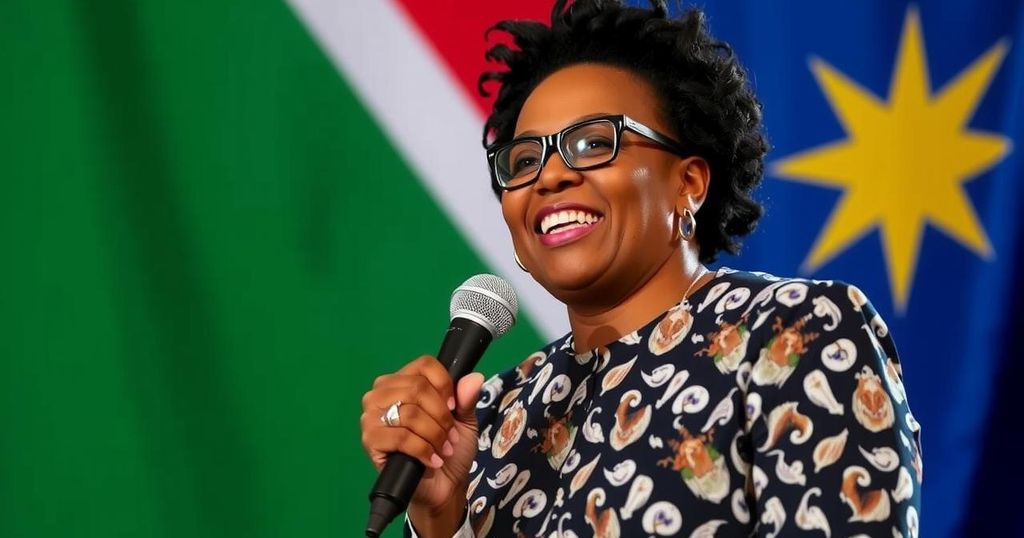Namibia is poised to elect its first female president, with Netumbo Nandi-Ndaitwah leading in a contested election. As 65.57 percent of votes are counted, irregularities and claims of a flawed process arise from opposition parties, particularly the IPC. If Nandi-Ndaitwah fails to achieve over 50 percent, a runoff vote may be required.
Namibia is on the verge of electing its first female president, as Netumbo Nandi-Ndaitwah leads the presidential race with 54.82 percent of the vote amidst ongoing ballot counting from a disputed election. So far, 65.57 percent of the votes have been tallied, though concerns over the legitimacy of the election have arisen following technical glitches and claims of irregularities. If Nandi-Ndaitwah does not surpass the crucial 50 percent threshold by the final count this week, a runoff will be necessary.
The results released early on Tuesday by the election commission indicate that Nandi-Ndaitwah, the 72-year-old candidate from the ruling South West Africa People’s Organisation (SWAPO), currently enjoys a significant advantage over her primary opposition, Panduleni Itula of the Independent Patriots for Change (IPC), who has garnered 28 percent. Votes from 79 of the 121 constituencies have been counted, including all but two from the capital, Windhoek. Approximately 73 percent of Namibia’s nearly 1.5 million registered voters participated in the election, which was originally expected to conclude shortly after the polls were held on November 27.
Logistical issues forced an extension of the voting period, as many citizens encountered long queues and technical difficulties that prevented them from casting their ballots in time. The IPC has rejected the electoral process as a sham, asserting that the voting extension and the associated problems undermined the election’s legitimacy. Opposition leaders, including Itula, have pledged to mount legal challenges against the results, citing numerous irregularities and attempting to safeguard the integrity of Namibia’s democratic process. Itula stated, “The rule of law has been grossly violated… and we cannot call these elections by any means or measure as free, fair and legitimate.”
Despite SWAPO’s prolonged governance since Namibia’s independence in 1990, discontent has been expressed among younger voters due to high unemployment rates and persistent inequalities. Should the results remain contested, various opposition parties are prepared to unite in a legal challenge to ensure that the electoral process is thoroughly scrutinized and upheld for the benefit of all Namibians, addressing the concerns raised about the government’s adherence to democratic principles.
As the counting proceeds and potential outcomes loom, the future of Namibia’s leadership remains uncertain. Nandi-Ndaitwah’s potential presidency symbolizes a pivotal moment in the nation’s history, while the challenges to the electoral process echo deeper societal issues that must be addressed to foster a more equitable political landscape.
Namibia has a history of stable elections after gaining independence from apartheid South Africa in 1990. The ruling party, SWAPO, has maintained authority since then, yet high youth unemployment and inequality have caused frustration among younger voters. Elections have typically been characterized by smooth processes; however, this recent electoral situation has raised significant concerns regarding transparency and legitimacy. Challenges from opposition parties reflect broader demands for accountability and representation in the country’s political framework.
In conclusion, Namibia stands on the brink of significant political change with the possibility of electing its first female president. However, serious allegations regarding electoral integrity and fairness threaten to sow discord. The response of the opposition to challenge these results emphasizes the critical importance of maintaining robust democratic principles and the ongoing need for reform to address the concerns of all citizens in this emerging democracy.
Original Source: www.aljazeera.com






